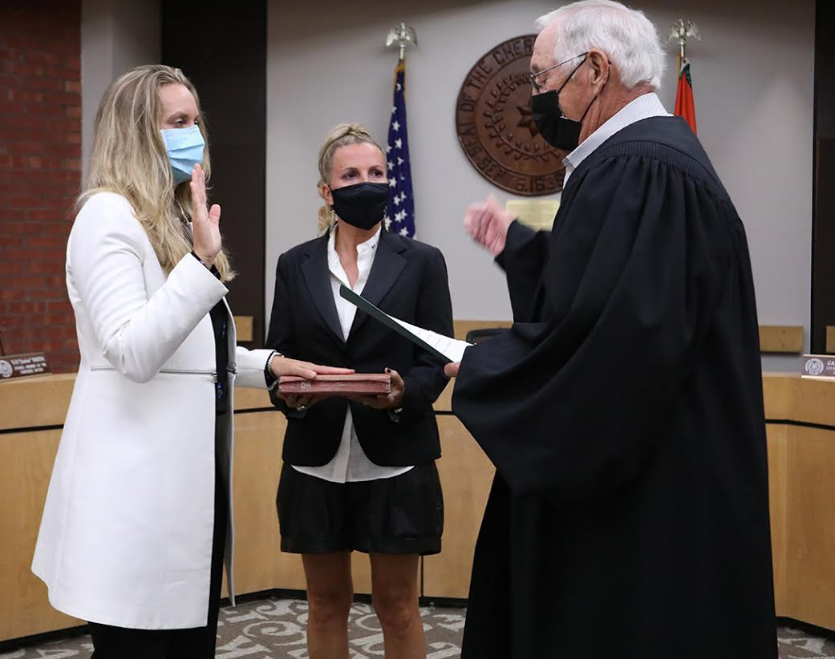
- Details
- By Native News Online Staff
TAHLEQUAH, Okla. — Cherokee citizen Shawna Baker is the newest member of the Cherokee Nation Supreme Court. She was sworn into office on Thursday, Aug. 27.
Baker brings 18 years experience as an attorney to the bench. A graduate of the University of Tulsa’s law school, Baker also obtained a master’s degree in law from Columbia University and a master’s degree in taxation from New York University.
Nominated by Cherokee Nation Principal Chief Chuck Hoskin Jr., Baker was confirmed by the Council of the Cherokee Nation at its Thursday session.
Baker joins former Justice Stacy Leeds and the late Justice Angela Barker-Jones as one of only three women to serve as a Supreme Court Justice in Cherokee Nation history.
“I applaud the Council’s decision to confirm the nomination of Shawna Baker to the Cherokee Nation Supreme Court. Justice Baker is a supremely qualified Cherokee who has the depth of experience that any Supreme Court in this country would like to have,” Chief Hoskin said.
“We need a Supreme Court that has a diversity of legal experience, and I truly believe we have found the right addition with Justice Baker. She is a Cherokee Nation citizen of the highest caliber, and I thank the Council for taking the right action in this historic moment.”
The Supreme Court is the highest court in the Cherokee Nation government, interpreting the tribe’s constitution and its statutes in all civil and criminal proceedings within the tribe’s broad jurisdiction.
“I am honored to become the third woman to serve on the Cherokee Nation Supreme Court,” Baker said. “My deepest gratitude to Chief Hoskin for my nomination, to the Tribal Councilors for your votes to confirm, to Stacy Leeds for breaking the glass ceiling and lifting up other Cherokee women, to Justice John Garrett for presiding over my swearing-in, to Jayme for your commitment and devotion, to my dear friends and to so many others who made today possible in one way or another. I will forever be grateful beyond measure.”
Some of Baker’s prior roles include a litigation associate, an attorney and a managing partner at a number of law firms. She also served as a trustee of a charitable organization and an assistant professor at the Florida Coastal School of Law. Most recently, she served on the Cherokee Nation Gaming Commission. She is also a member of several bar associations including the Cherokee Nation Bar Association.
“What an honor it is to be able to help put forward an exceptionally talented Cherokee woman to our tribe’s highest court,” said District 15 Tribal Councilor Janees Taylor. “I am honored to have given her my vote, and I am excited to see someone with her experience, tenacity and perspective serving on our Supreme Court.”
Baker will serve the remaining four years of former Supreme Court Justice Lynn Burris’ term after his passing in March. She joins Supreme Court Chief Justice James G. Wilcoxen and Justices Lee W. Paden; Mark L. Dobbins and John C. Garrett.
More Stories Like This
NCAI Passes Two Emergency Resolutions on Immigration Enforcement ActivitiesChickasaw Lighthorse Police Officer named Indian Country Law Enforcement Officer of the Year
Indian Gaming Association Rallies Broad Coalition Against Sports Event Contracts It Calls Illegal Threat to Tribal Sovereignty
Navajo Resources and Development Committee Issues Notice on Livestock Inspection Requirements
American Prairie, Tribal Coalition Files Protest Over Rescinded Grazing Rights
Help us defend tribal sovereignty.
At Native News Online, our mission is rooted in telling the stories that strengthen sovereignty and uplift Indigenous voices — not just at year’s end, but every single day.
Because of your generosity last year, we were able to keep our reporters on the ground in tribal communities, at national gatherings and in the halls of Congress — covering the issues that matter most to Indian Country: sovereignty, culture, education, health and economic opportunity.
That support sustained us through a tough year in 2025. Now, as we look to the year ahead, we need your help right now to ensure warrior journalism remains strong — reporting that defends tribal sovereignty, amplifies Native truth, and holds power accountable.
 The stakes couldn't be higher. Your support keeps Native voices heard, Native stories told and Native sovereignty defended.
The stakes couldn't be higher. Your support keeps Native voices heard, Native stories told and Native sovereignty defended.
Stand with Warrior Journalism today.
Levi Rickert (Potawatomi), Editor & Publisher

